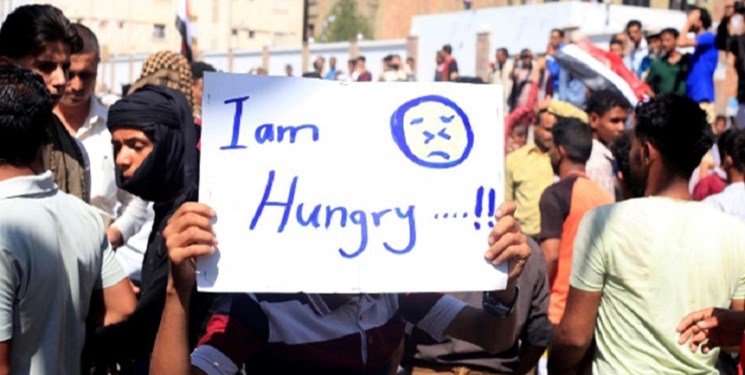Despite the existing problems and shortages, international aid is decreasing. The United Nations has only been able to provide a quarter of the required aid for Yemen this year. It has been estimated that about 500,000 Yemeni children under five are facing acute malnutrition. UNICEF also estimated that about ten million children in that country do not have adequate access to medical care. The situation in Yemen is getting worse with political deadlock and humanitarian crises. About eighty percent of the country’s population needs help. Half of the 22 million Yemenis who need such assistance are children.
The Economic Committee affiliated with the Supreme Political Council of Ansarollah of Yemen believes that the policy of starvation and looting that the warring countries have undertaken in the occupied areas of Yemen in recent years has harmed all the people of that country. The deterioration of the economic and living conditions in the occupied areas of Yemen (areas under the control of the resigned government and the Arab coalition) results from the corruption of the aggressor countries and their mercenaries during the eight years of war. The fall in the value of the Yemeni currency is a deliberate and planned action since the use of national resources to fund the war against the Yemeni people.
The aggressor countries insist on looting the revenues of sovereign sources for their own benefit. They are against all solutions that guarantee the use of those revenues to reduce the pain and suffering of the Yemenis. Those countries are responsible for the pain and suffering of the Yemeni nation since the beginning of the aggression, siege, economic war, and systematic looting of the facilities of the Yemeni people.
The forced displacement of the Yemeni people is one of that country’s problems. The Organization for Monitoring Refugee Camps in Yemen has announced that during the first half of 2023, more than 26,000 people were displaced from their homes in Yemen. Between January 1 to June 30, 2023, 4,700 families, totaling 26,000 people, were displaced from their residential areas to another place in Yemen. Those families are from 20 provinces of Yemen and have settled in 10 provinces other than their place of residence. Only last June, 541 families with 2,693 members were displaced from their homes, 458 families were displaced for the first time, and 83 families were displaced for the second time.
The United Nations has repeatedly sounded the alarm and warned about the risk of death of millions of Yemeni children due to hunger. The United Nations Children’s Fund (UNICEF) is warning that millions of children in Yemen are at risk of starvation unless urgent action is taken to ensure enough funding to provide life-saving aid. Commitments have been made with European partners to provide relief and life-saving support. About six million children in Yemen are just one step away from starvation and need immediate support. The World Food Program has announced an urgent need for 80 million dollars to continue providing life-saving food aid to Yemeni children.
Earlier this year, UNICEF announced its need for around 450 million dollars to continue providing life-saving humanitarian aid to children in Yemen. At the same time as the Saudi delegation held talks with Yemen’s Ansarollah in Sana’a last April, Riyadh announced by issuing a decree that it had lifted the ban on the entry of 500 items of prohibited goods into Yemen, which had been banned six years ago, and that ships traveling to Yemen without any inspections can enter the ports of Yemen, but what has happened in practice, the blockade of that country has not been completely lifted. The government is still under siege and embargo in selling oil and making money from it to meet the needs of the people.
Yemen’s Ansarollah believes that the Security Council continues to rely on rumors on social networks and is entirely far from understanding the suffering and problems of the Yemeni nation. The best solution is to oblige the leaders of the Arab coalition to pay the salaries of Yemeni employees and deliver cash aid to deserving people. As aggressors, Arab coalition countries should be obliged to rebuild the country and compensate the Yemeni people. In addition to the deterioration of the economic situation, security chaos prevails in all areas under the control of the militias.
Although, according to Yemeni Ansarollah, “attempts have been made to stabilize the ceasefire and create a space for dialogue between the parties to achieve a comprehensive and stable political solution, Yemeni Ansarollah has emphasized in its latest position that there is no ceasefire in Yemen today, but we have provided a reduction in tension and the opportunity for mediation. We are still talking about humanitarian issues before anything else. There is no justification for continuing the blockade, and we welcome any role of any Arab country in solving the crisis. Still, we want to talk with the aggressor countries, not their mercenaries. The negotiations have reached an impasse, and we are ready for emergencies. The enemy wants to erode our strength, but it will not win; instead, it will fail. The role of the US as a participating party in the aggression against our country is a matter of concern, and they are partners in imposing the suffering that the Yemeni people are exposed to”.










0 Comments